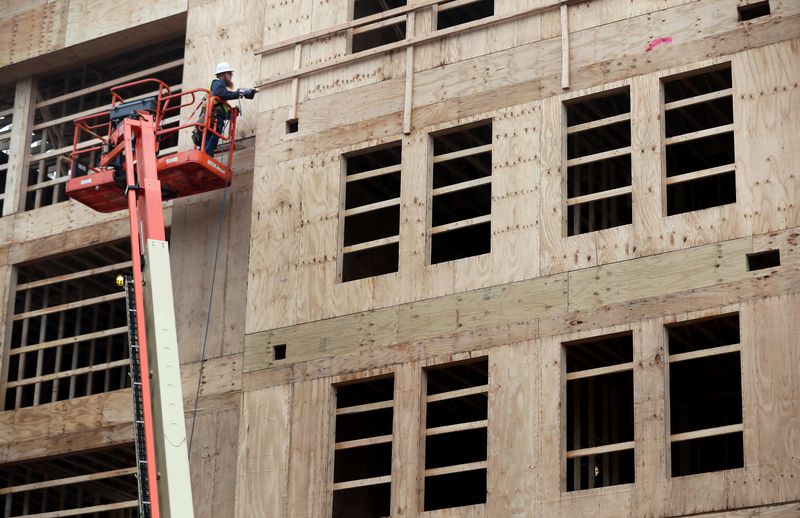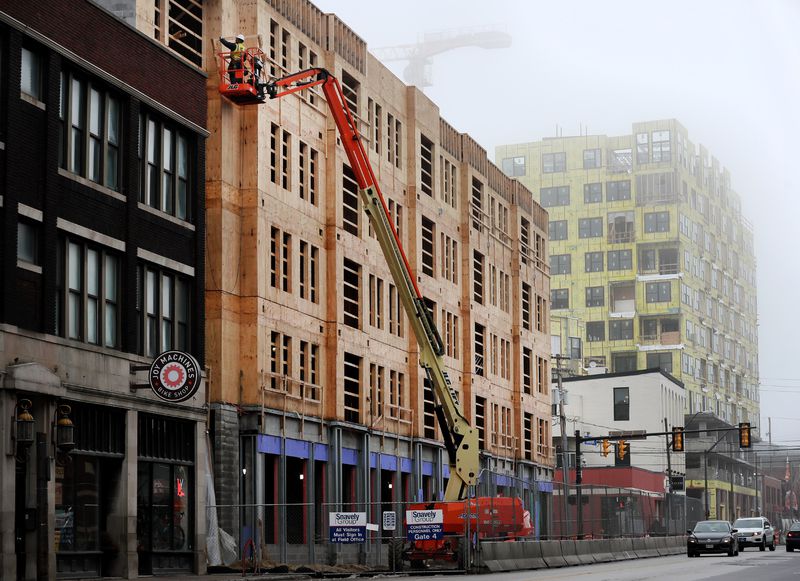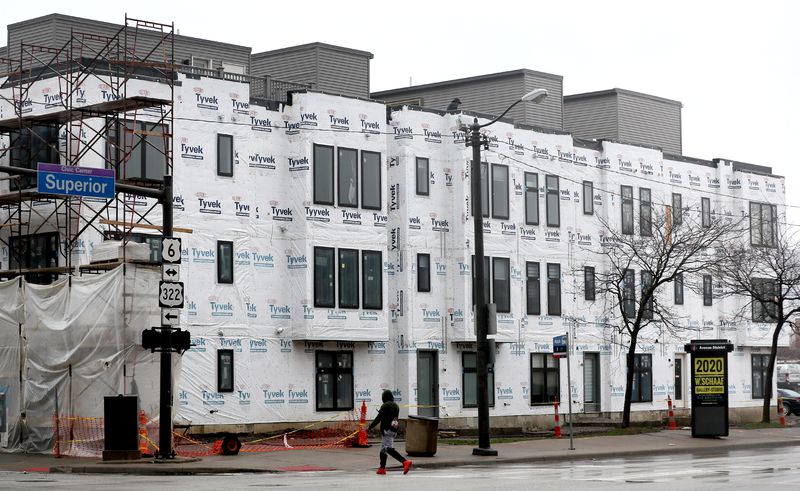Construction in Ohio deemed “essential,” but coronavirus prompts rising worker absenteeism, anxiety

Work continues on the second phase of the Quarter apartment project on Detroit Avenue in Cleveland’s Ohio City neighborhood on Monday. Construction laborers still are reporting to work across the region, in the wake of the state’s determination that the industry is an “essential” business that can operate during a public health crisis.
CLEVELAND, Ohio – The company overseeing construction at the Lumen apartment tower in downtown Cleveland sent out the sort of message Saturday that nobody wants to write – or read.
A worker on the theater-district project had tested positive for COVID-19, the illness caused by the new coronavirus.
Gilbane Building Co. shut down the project for two days. The general contractor hired a cleaning specialist to sanitize areas where the worker, who was last on site March 14, had been. Construction resumed Tuesday, the first day of Ohio’s broad stay-at-home order – and the first day that the industry operated under an exemption from that order, as an “essential” business.
Across the country, construction crews are wrestling with what it means to be essential during a public health crisis. Like Ohio, many states in shutdown mode have carved out building as a key business, one that’s necessary to keep the economy moving, to provide Americans with shelter and to ensure that structures including hospitals can be maintained and expanded.
New York and Illinois, for example, deemed construction essential. Pennsylvania shut it down, with some exceptions. The mayor of Boston ordered laborers off work sites, as did the neighboring city of Cambridge. In many states, construction companies are trying to figure out where their projects stand while parsing broad stay-home orders and lists of critical businesses.
“You can basically make the argument under the order that anything is either essential or is an exemption,” said Allison Taller Reich, a construction attorney and partner at the Frantz Ward law firm in downtown Cleveland. “You can basically make an argument that everything is allowed to move forward. And then there’s a question of should it.”
Even essential businesses must take safety precautions – or face penalties and closure – under Gov. Mike DeWine’s order. Those measures include keeping a 6-foot distance between people, when possible; frequent cleaning of equipment, particularly anything that’s touched often or by multiple people; and offering hand sanitizer or facilities for handwashing.
Major contractors in the region said they’ve implemented measures to keep workers safe. Gilbane, which has projects across the country, has stepped up disinfecting of corridors at the Lumen, added handwashing stations and split workers into small, spaced-out groups for morning pre-construction stretching routines, said Wes Cotter, a spokesman.
The company also has largely barred workers from riding in the construction hoist with materials – a social-distancing move that means laborers now must climb the stairs at the 34-story tower. “We’re super-focused on keeping everybody healthy,” Cotter said. “We are not taking this lightly at all. No one should think that.”
One worker, who asked not to be identified by name, questioned whether construction of luxury apartments is necessary during a pandemic. “I want to keep working, but I think they should have closed because it’s not essential. You need to go on a job-by-job basis,” said the worker, who also worried that stepped-up sanitation measures at the Lumen are insufficient.
Some owners and developers have quietly halted construction and sent workers home. Others are struggling with staffing, as workers call off sick or walk off sites. Several contractors said they’re having a particularly difficult time finding and keeping workers who handle interior jobs, like drywall or electrical work.
“Most of these guys have a lot of ego. They’re big, tough guys. They don’t want to see the doctor. … Maybe 12 to 15% of people are really just afraid to come in,” said Trevor Cost, the owner of Warren Roofing & Insulating Co., based in Walton Hills. “The rest of them, I think we have to put maybe a little bit more fear into them.”
At the Church and State apartment project in Cleveland’s Ohio City neighborhood, Cost is splitting up groups of workers to give everyone more space. He added handwashing stations and ordered portable toilets specifically for his crew so that they don’t have to share bathrooms with other subcontractors. In some cases, he’s hand-delivering hand sanitizer to sites.
“It’s not highly productive,” he said of this new way of working, “but we’ll be moving the project forward. People will continue to get paychecks, and the owner won’t sue me.”
Construction is a dirty, high-risk business. It’s also a major employer in Ohio, where the Bureau of Labor Statistics recorded 229,400 construction jobs in January, based on seasonally adjusted figures.
Last week, trade groups for the commercial construction and homebuilding businesses were advocating for Ohio to categorize the industry as critical. This week, they’ve been digesting the governor’s order and navigating a landscape that seems to change daily.
“We know that there’s a lot of people who are nervous,” said Don Taylor, president and chief executive officer of Fairlawn-based Welty Building Co. “Tradespeople are very nervous. Nobody signed up for a death sentence to be in construction. It’s dangerous enough.”
Welty, whose current projects include government-affiliated work, hospital construction and housing, hasn’t seen any jobs canceled, though some are delayed. Taylor said one electrical subcontractor decided to shut down because the company couldn’t figure out how to get work done under social-distancing requirements. “We think that’s an extreme,” he said.
On Tuesday, Welty asked laborers to change their clothes and shower after work, rather than sitting at the dinner table or on the couch in grubby gear. Workers are being asked to wipe down shared tools before and after using them. The company ordered thermometers for on-site temperature checks and is asking subcontractors and vendors to follow suit.
“We’re working through these things,” Taylor said. “I’m not going to say we’re perfect.”

Construction continued Monday at apartment projects in Cleveland’s Ohio City neighborhood. Contractors are grappling with rising absenteeism as workers call in sick or choose to stay home out of fear of catching, or spreading, the coronavirus.
Absenteeism spiked this week at local sites managed by construction company Turner, whose projects include the Church and State apartments and the new hospital at MetroHealth Medical Center in Cleveland. At sites, Turner has added handwashing stations, including ones that use hot water where possible, and has managed to keep hand sanitizer in stock, said Jason Jones, the company’s vice president and general manager in Cleveland.
While grappling with on-site challenges, the company also is monitoring supply-chain issues related to the coronavirus crisis. A structural-steel vendor and other suppliers are idled in Pennsylvania. Anticipating problems getting materials from Canada, Turner pre-purchased all of the spray-on fireproofing required for the MetroHealth project from a Canadian vendor, rather than waiting to buy the material when it’s needed.
Reich, the construction attorney, said some construction companies are worried about keeping enough personal protective equipment, such as masks, on site. Contractors are trying to balance their own needs against requests from hospitals’ seeking more protective gear.
“The lack of PPE is a huge concern, and people are really wary of running afoul of the order and being forced to default on their contracts,” she said, adding that nobody should be working on a construction site without proper protective equipment.
Even with Northeast Ohioans largely confined to their homes, new housing construction continues. Builder Bo Knez said he’s still receiving calls from buyers interested in his projects – to his surprise. Like commercial builders, he’s seeing fewer tradesmen on his sites. One of his contractors voluntarily shut down for two weeks after a worker was exposed to COVID-19. Other laborers are staying home because they’re nervous or they no longer have childcare.
“We’re probably running at 60 to 65% of where we were 10 days ago,” said Knez, who has roughly 100 homes under construction across the region and another 150 planned.

Residential construction hasn’t stopped at projects including the Avenue townhomes in downtown Cleveland. Builder Bo Knez said he’s still receiving sales calls – to his surprise.
Reich said she’s working on furlough and layoff plans for companies that anticipate work slowdowns or stops. On one hand, having a state order to read, and interpret, is providing more clarity for clients who feared a complete halt to construction. On the other hand, the industry’s status as essential puts a burden back on employers – and workers – to decide what’s safe, and reasonable, when the stakes seem incredibly high and the future is far from certain.
“People need to use their judgement and talk to their people,” Reich said. “Labor is so short, as it is. Do you want that person not coming to work now and maybe not coming to work for you again, ever?”
